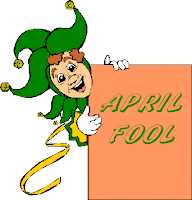I was interested in the history of April Fools’ Day, so I did some research. I decided to share what I found out here. It was really interesting to me.
April fools’ Day is celebrated on the first of April. People play jokes on their friends, family, and even on people they don’t know. In France, Ireland, Italy, Japan, Russia, The Netherlands, Brazil and in the US, the jokes are played all day long. However, in the UK, Australia, Canada and South Africa, they are only played until noon. If you play one after noon, you are called an “April Fool.”
It is thought to have originated in Canterbury Tales (1392) by Chaucer. In there is the Nun’s Priest’s Tale and it speaks of March 32. Since March only has 31 days, people thought that April 1st was a joke. In the tale, a cock was tricked by a fox. Some people believe that Chaucer really meant 32 days after march, which would be May 2nd, but nevertheless, we celebrate it on April 1st.
There are other possible origins of April Fools’ Day that you can read at: http://en.wikipedia.org/wiki/April_Fools . This is where I got my information, as well as a few other web sites. They also have a list of pranks that people have played in the past.
http://www.infoplease.com/spot/aprilfools1.html This site has even more possible origins for April Fool’s day, but I still like the one I wrote about best because I like Canterbury Tales.
Leave a comment on how your country celebrates it or if they celebrate it at all.


.jpg)
